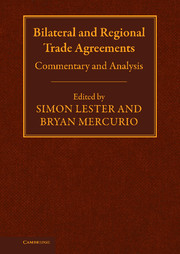Book contents
- Frontmatter
- Contents
- List of contributors
- Acknowledgements
- Foreword
- Table of cases
- Table of Treaties and International Agreements
- Table of abbreviations
- Part I Introduction
- Part II Economics and politics of PTAs
- Part III Relationship with WTO and international law
- Part IV Legal aspects of PTAs: A comparative analysis
- 7 Agriculture
- 8 Services
- 9 Investment
- 10 Government procurement
- 11 Intellectual property
- 12 Social issues: Labour, environment and human rights
- 13 Dispute settlement
- Index
- References
12 - Social issues: Labour, environment and human rights
Published online by Cambridge University Press: 16 December 2009
- Frontmatter
- Contents
- List of contributors
- Acknowledgements
- Foreword
- Table of cases
- Table of Treaties and International Agreements
- Table of abbreviations
- Part I Introduction
- Part II Economics and politics of PTAs
- Part III Relationship with WTO and international law
- Part IV Legal aspects of PTAs: A comparative analysis
- 7 Agriculture
- 8 Services
- 9 Investment
- 10 Government procurement
- 11 Intellectual property
- 12 Social issues: Labour, environment and human rights
- 13 Dispute settlement
- Index
- References
Summary
Introduction
A. Trade and social issues
International trade agreements have various effects on the ability of countries to protect their social values, including labour and environmental standards and human rights. At the most general level, trade increases welfare, which can be spent on social protection; indeed, the preamble of the WTO Agreement claims as one of its primary objectives the ‘raising [of] standards of living’. As the World Commission on the Social Dimension of Globalisation said in its 2004 report, ‘wisely managed, [the global market economy] can deliver unprecedented material progress, generate more productive and better jobs for all, and contribute significantly to reducing world poverty’.
But the ‘mutual supportiveness’ of trade and social protection is ambiguous at best. At the overall level, structural economic changes as a result of increased trade can enhance employment opportunities for minority groups, but can also do the opposite, and can in addition (and indeed should) also lead to short-term unemployment in inefficient sectors. Increased economic competition, a primary function of trade, should make goods and services more affordable to consumers, but if this undermines public subsidies, it can do precisely the opposite, with detrimental social consequences. With respect to the environment, the economic efficiencies resulting from trade should lead to an efficient use of natural resources, but any increase in economic activity, also a result of trade, can put pressure on the environment.
- Type
- Chapter
- Information
- Bilateral and Regional Trade AgreementsCommentary and Analysis, pp. 342 - 366Publisher: Cambridge University PressPrint publication year: 2009
References
- 6
- Cited by



